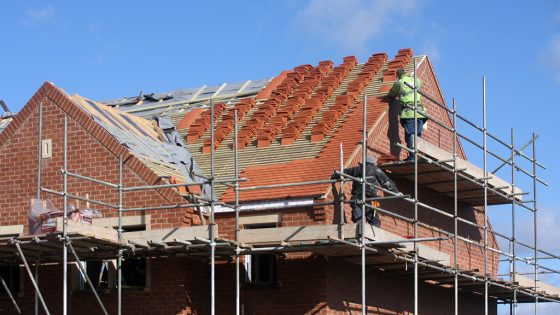Eight major housebuilders are being investigated for possible breaches of competition law.
The Competition and Markets Authority (CMA) has launched a probe into “suspected anti-competitive conduct by housebuilders” relating to “concerns that they may have exchanged competitively sensitive information” including non-public information on sales prices, incentives, and rates of sale.
The eight housebuilders now under investigation under the Competition Act 1998 are: Barratt Developments; Bellway; The Berkeley Group; Bloor Homes; Persimmon; Redrow; Taylor Wimpey; and Vistry Group – as well as subsidiaries of each company.
The investigation stems from the CMA’s year-long study into competition in the housebuilding sector, released today (26 February), in which the regulator raised a raft of “fundamental concerns” on issues such as planning and market structures.
CMA chief executive Sarah Cardell said: “[We have] today opened a new investigation into the suspected sharing of commercially sensitive information by housebuilders which could be influencing the build-out of sites and the prices of new homes.
“While this issue is not one of the main drivers of the problems we’ve highlighted in our report, it is important we tackle anti-competitive behaviour if we find it.”
The CMA said it had “not reached any conclusions at this stage as to whether or not competition law has been infringed”.
Spokespersons for Bellway and Redrow Homes said the companies had fully cooperated with the CMA, while a representative of Bloor Homes said the housebuilder had been transparent with the CMA. A Taylor Wimpey spokesperson said it would cooperate fully with the CMA around the investigation (see comments below).
Construction News also contacted Barratt Homes, Persimmon Homes and Vistry for comment. Berkeley Homes declined to comment.
In its report into the housebuilding, the CMA raised concerns over planning, new housing quality, a lack of innovation, private estate management and “the limitations of private speculative development” in housebuilding.
The CMA said innovation in housebuilding is “lower than we might expect in a dynamic, well-functioning market” and warned that take-up of modern methods of construction (MMC) has been “slow”. It suggested this is due to large upfront costs and the need for coordination between multiple stakeholders for it to work.
Competition has not driven innovation around energy efficiency in new homes, the CMA warned, adding that instead this had been driven by “government intervention through regulation, stewardship, and funding”.
The report also criticised the planning system, with the CMA warning it is “exerting a significant downward pressure” on the number of planning permissions being granted in the UK.
It said the planning process is “significantly costly, lengthy and complex”, while housebuilders suffer from a “lack of predictability” when they try to navigate the planning system. It argued there are “mixed and inconsistent incentives” for local authorities when it comes to meeting the need for housing.
This could all be having a disproportionate impact on SMEs, the report warned.
Private housebuilders, the CMA said, are “more likely” to focus on meeting the demand for homes rather than the need, so they can sell what they produce. The report said this could “under-deliver housing relative to the socially desirable level”, and that housebuilders “may have less incentive” to produce housing for people on lower incomes.
It said the government should look to increase the delivery of public housing to meet what is required.
The CMA also set out a raft of other recommendations, including that planning fees be raised to a “cost-reflective level” and that SME housebuilders get more guidance on housebuilding. It called for a “simpler ‘outline’ stage” of planning permissions, to better streamline the process.
Rico Wojtulewicz, head of policy and insight for the National Federation of Builders and the House Builders Association, said the report confirmed “a broken planning process” has caused the lack of social housing.
“None of this is new or uncontroversial but the UK needed this CMA report to keep hammering home the reality that politicians of all colours are the reason we have a housing and placemaking crisis,” he added.
“It’s time they stopped blaming builders and instead were held accountable for the mess they have caused and keep causing.”
Comments from housebuilders under investigation
A spokesperson for Bellway said it is reviewing the CMA’s report and had “engaged and cooperated fully” with the CMA throughout its study.
“We remain focused on the delivery of high-quality new homes that meet local demand and enhance the communities we build in as we work to increase the supply of UK housing,” they added.
A spokesperson for Redrow Homes also said it had “fully cooperated” with the CMA.
“We remain focused on the delivery of high-quality and much-needed new homes as part of our work to create thriving communities across England and Wales.”
A spokesperson for Bloor Homes said it had been “transparent” with the CMA throughout the study and was reviewing the findings.
“We will continue to work with them throughout the course of the investigation.”
A spokesperson for Taylor Wimpey said it “welcomes” proposed changes to the housebuilding sector, particularly around the planning process. “Taylor Wimpey notes the investigation opened today and we will cooperate fully with the CMA in relation to this,” they added.

